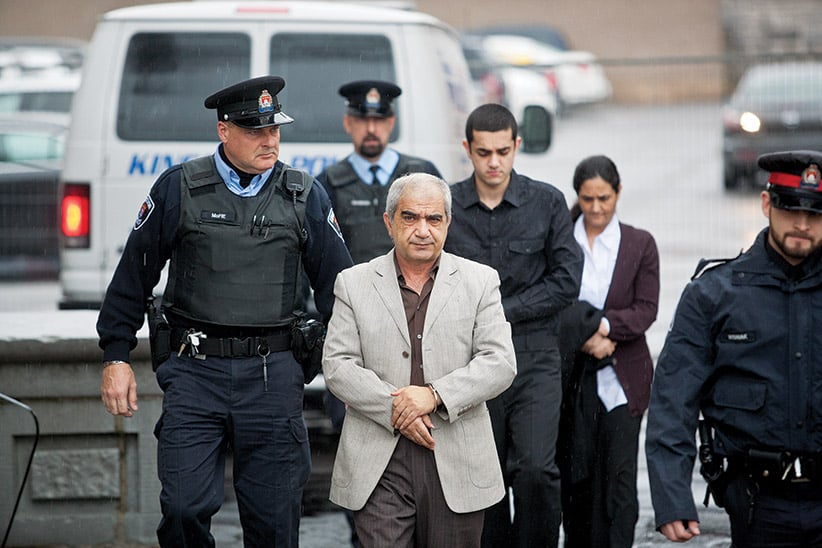Shafia family ‘honour killers’ fight for new trial
Lawyers for the imprisoned trio argue that 2012 guilty verdicts may have been ‘tainted by cultural prejudice’
KINGSTON, ON. DECEMBER 5, 2011– Mohammad Shafia (l), eldest son Hamed Shafia and Tooba Mohammad Yahya ( back) exit a police van and are escorted to the Kingston Courthouse on Monday December 5, 2011. He along with his dad and mother are accused of killing the teenage Shafia sisters and Shafia’s first wife in a polygamous marriage over family honour.
MACLEAN’ S PHOTO BY Vincenzo D’Alto
Share
More than four years after they were convicted of a mass “honour killing” that horrified so many Canadians, the Shafia family murderers—father, mother and eldest son—are back in court, fighting for a new trial.
Lawyers for the imprisoned trio (Mohammad Shafia, 62; Tooba Yahya, 46; and Hamed Shafia, 25) will be at the Ontario Court of Appeal Thursday morning, arguing that the 2012 guilty verdicts handed down by a Kingston jury may have been “tainted by cultural prejudice” and “pre-existing stereotypes of violent and primitive Muslims.” At the heart of the killers’ quest for a new trial is one argument: that the original judge should not have allowed the expert testimony of Shahrzad Mojab, a University of Toronto professor who specializes in honour-based violence.
A key witness for the prosecution, Mojab explained to the jury how in some Middle Eastern cultures, a family’s honour is measured by the obedience and chastity of its women—and that even the mere perception of inappropriate conduct, especially premarital sex, is punishable by death. “The shedding of blood is the way of purifying the name of the family in the community,” she testified in December 2011. “It is an expected act. It is expected that the honour of the family be restored and controlled.”
In a lengthy factum filed in advance of Thursday’s hearing, the Shafias claim Mojab’s testimony “created enormous prejudice” because it implied they “had a disposition to commit family homicide” because they were Afghan immigrants. “Allowing cultural disposition evidence tempts jurors to follow their worst impulses and creates the risk that defendants will be judged by their background rather than their proven actions,” their factum argues.
The Shafias’ lawyers have also filed a fresh evidence application, claiming that Hamed was actually 17 when his sisters turned up dead—not 18, as originally believed. If true, Hamed should have enjoyed certain protections under the Youth Criminal Justice Act, including a potentially lighter sentence and much earlier parole eligibility. (Like his parents, Hamed was convicted of four counts of first-degree murder and sentenced to life in prison with no chance of parole for 25 years).
The fresh evidence regarding Hamed’s age—and the Crown’s response to that new evidence—remains sealed, pending Thursday’s hearing.

The sensational case dates back nearly seven years, when a black Nissan Sentra was discovered at the bottom of Kingston Mills, a lock station on the Rideau Canal. Floating inside the submerged car on June 30, 2009 were three sisters—Zainab Shafia, 19; Sahar Shafia, 17; and Geeti Shafia, 13—along with 52-year-old Rona Amir Mohammad, the girls’ supposed aunt who was actually their father’s infertile first wife in the secretly polygamous clan. Police initially assumed they were dealing with a tragic traffic accident. Within hours, suspicion had settled in.
Questioned by a detective, Shafia, Tooba and Hamed told essentially the same story: that the family of 10 was driving home to Montreal after a Niagara Falls vacation (split between two cars, the Sentra and a Lexus SUV) when they stopped at a Kingston motel for the night. Zainab grabbed the keys to the Nissan, they said, and the next morning, she and the other three were nowhere to be found.
Near the lip of the canal, however, an alert officer found tiny shards of plastic—fragments that were later matched to the Lexus headlight, placing both family cars at the locks that night. Even more damning, dents and scratches on the front left side of the Lexus were consistent with damage on the Nissan’s back bumper, proving that one car rammed the other into the water.
Over the next two weeks, detectives also discovered much more about Mohammad Shafia, a tyrannical father who moved his children to the freest of countries but insisted they adhere to his oppressive, old-world honour code. The girls rebelled instead. Zainab ran away to a women’s shelter. Sahar had a secret boyfriend. Geeti, despite her young age, was perhaps the boldest of all, telling school officials she wanted to be placed in foster care. Desperate for a divorce, Rona told numerous relatives that she had endured years of physical and emotional abuse.
Closing in on their suspects, investigators planted hidden wiretaps—then listened as Shafia railed against his dead daughters: “Whores.” “Filthy.” “Treacherous.” “May the devil s–t on their graves!”
“We lost our honour.”
“Nothing is more dear to me than my honour.”
“There is no value of life without honour.”
It took the jury just 15 hours of deliberations to endorse the prosecution’s theory: that the Shafia girls’ westernized, disobedient behaviour had so shamed the family that mass homicide—disguised to look like a foolish wrong turn—was the only way to erase the stain. Rona was a convenient throw-in, killed because she, too, wanted to escape the family home.

“It is difficult to conceive of a more heinous, more despicable, more honourless crime,” Justice Robert Maranger said on Jan. 28, 2012, after the guilty verdicts were announced. “The apparent reasons behind these cold-blooded, shameful murders was that the four completely innocent victims offended your twisted notion of honour—a notion of honour that is founded on the domination and control of women, a notion of honour that has absolutely no place in any civilized society.”
In its own factum filed with the Court of Appeal, the Crown says “there is overwhelming evidence that this was a planned and deliberate murder,” and that the Shafias do not deserve a second trial. As for Mojab’s testimony, it was “balanced and respectful,” prosecutors say.
“The evidence that ‘honour’ provided the motive for killing the deceased came not from Dr. Mojab, but rather from Shafia himself,” the Crown factum continues. “Following the deaths of his wife and daughters, Shafia repeatedly spoke about honour, and its relationship to their deaths, with Tooba and Hamed. His words, properly understood, explained that the deceased were killed because they had offended the Shafia family’s honour.”
The appeal hearing is scheduled for Thursday and Friday.